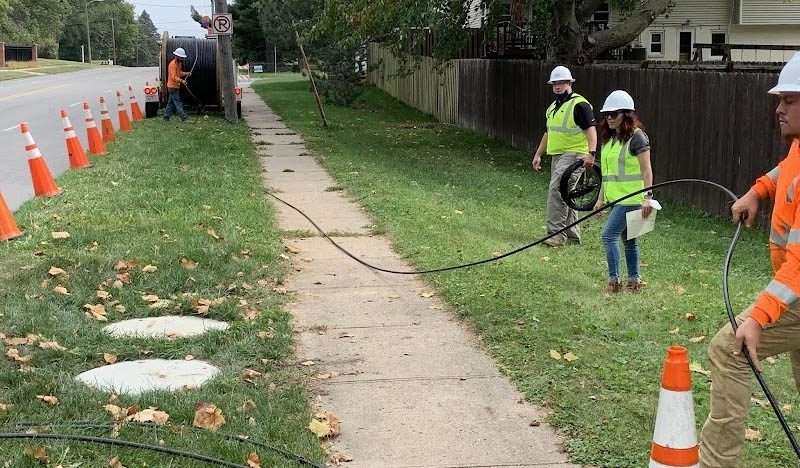West Des Moines Is Growing Muni Broadband Battleground
FCC gets earful on Mediacom petition claiming favorable treatment for Google Fiber

The smarter way to stay on top of the multichannel video marketplace. Sign up below.
You are now subscribed
Your newsletter sign-up was successful
Cable broadband operators are concerned that localities could start putting a thumb on the scale for Google Fiber when it comes to broadband service — making it a less-free market in which to compete for eyeballs and subscription dollars — and they want the Federal Communications Commission to nip that notion in the bud.
The current battleground over the extent to which municipalities can build out broadband is West Des Moines, Iowa. Incumbent provider Mediacom Communications wants the FCC to require the city to stop construction on Google Fiber‘s network, stop marketing service to residents and reconfigure the network and contract.
Also Read: NCTA Says Google Fiber Definition of Competition Is Too Narrow
Opponents of the petition — comments were due Oct. 7 — said the FCC does not even have the authority to grant it.
Mediacom earlier this year asked the FCC to declare that the preferential treatment it says the city was extending to Google Fiber violated the Communications Act requirement that providers get nondiscriminatory access.
ACA Connects — the trade group representing Mediacom and other smaller, independent cable providers — filed comments in the proceeding saying preferential rates, terms and conditions obtained by Google Fiber clearly did not fit the competitively neutral directive of the Communications Act’s Section 253.
ACAC suggests the potential problem goes further than West Des Moines, and the commission needs to recognize that.
“[T]he FCC should recognize that the City’s alleged actions are of general concern to all providers regardless of location,” ACAC said in its comments. “Incumbent providers of telecommunications service and new entrants alike, including ACA Connects members, are concerned that actions by state or local governments in providing access to [public rights of way], including those like the City’s, may skew the market, such that they cannot compete in a fair and reasonable legal and regulatory environment as envisioned by Section 253.“
Muni Advocates Weigh In
Not surprisingly, Next Century Cities, which comprises advocates of municipal broadband service, filed in opposition to the Mediacom petition.
Next Century told the commission that Mediacom was trying “to prohibit a local government’s public-private partnership agreement that is designed to increase competition and expand broadband service options for residents.” It said the declaratory ruling would set the “negative precedent” that could discourage cities from forming public-private partnerships to close the digital divide.
Next Century was certainly suggesting ACAC‘s fear that not declaring such muni deals with Google Fiber violated the Act could encourage others was well-founded.
Also Read: More Muni, More Money
“Local officials nationwide are exploring opportunities to bring high-quality, affordable broadband within reach for residents and businesses,“ Next Century said. “These initiatives are often necessary, innovative, and community-driven, yet face numerous obstacles,“ including what it called "federal interference," and what ACAC would call the obstacle that favoring Google Fiber violates FCC rules.
But Next Century said that even if the FCC wanted to invalidate the Google Fiber deal, it gave up that authority when it reclassified broadband as an information service under Title I of the Communications Act. “Mediacom‘s complaint only pertains to the deployment and delivery of broadband Internet access service and does not affect the delivery of telecommunications services,” Next Century argued. “Therefore, the commission lacks authority to rule on this matter.”
Google Claims Mischaracterization
In its comments, Google said Mediacom‘s petition mischaracterizes its agreement with the city, which it says is not a grant of monopoly control of conduits; is not a subsidy to the company; grants it no special permitting or access rights; and is not on more favorable financial terms than other all-fiber ISPs.
Besides, the FCC has never been in the business of rewriting private contracts and should not start now, it said.
Among those filing in support of Google and West Des Moines were INCOMPAS, the National Association of Telecommunications Officers and Advisers (NATOA), the U.S. Conference of Mayors, and National League of Cities, among others.
INCOMPAS, whose members include Google, urged the FCC to deny the petition, saying West Des Moines was just trying to create an open conduit network that will provide fast, competitive fiber to residents throughout the city.
Municipal networks have a friend in the White House. President Joe Biden has signaled that he would favor targeting broadband subsidy money to municipal nets and public-private partnerships, which he has signaled equates to better and cheaper broadband service and cable broadband providers argue often leads to failed efforts and taxpayers holding the bag.
The smarter way to stay on top of the multichannel video marketplace. Sign up below.
Contributing editor John Eggerton has been an editor and/or writer on media regulation, legislation and policy for over four decades, including covering the FCC, FTC, Congress, the major media trade associations, and the federal courts. In addition to Multichannel News and Broadcasting + Cable, his work has appeared in Radio World, TV Technology, TV Fax, This Week in Consumer Electronics, Variety and the Encyclopedia Britannica.

